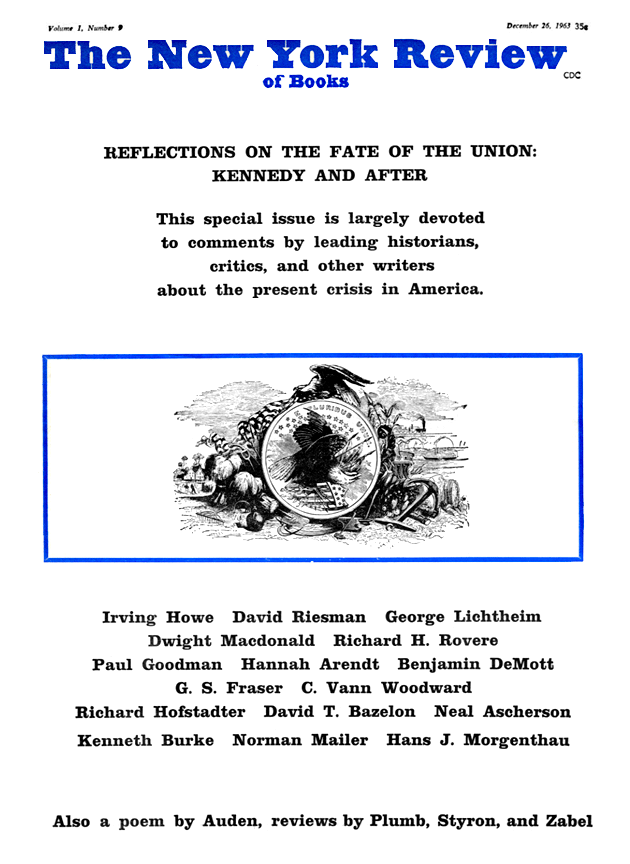Can our country fall back wholly into its same trivial ways? Though the tragic hero died intestate, there will be much quarreling over the will. But can his libertarian wishes be ignored completely?
Or, ironically, might there now even be a better chance that some of his policies (in particular those on civil rights) will be enacted into law? While he lived, we could simply take for granted his rare virtues in the conducting of his office. So people went on bickering and carping, trying to catch him up in the many trick ways available to questioners. And using the standard devices of rhetoric. Whatever he did, he should have done more or less. Whenever he did it, he should have done it sooner or not so soon. However he did it, he should have done it another way. And whatever his reasons, they were the wrong ones. Such is standard practice in the hagglings of political faction. Go, please, and read Aristotle’s Rhetoric, a work some parts of which should be required reading for students in any democracy, and at least as early as high school.
With the damned commercials and vulgar entertainment kept out (my God, it takes nothing less than the insane murder of a great world figure to clear the air for as few as three days!), the broadcasting companies established a notable fact. They had built up an organization that could transcend itself. In view of the burdens suddenly placed upon these operators, one must grant that their performance was magnificent, showing beyond a doubt how much true “morality of production” there is implicit in the daily routines to which they must devote themselves.
Yet, let’s be frank. Programs kept at such a pitch of urgency and meditation and solemnity would be intolerable. If we must be bombarded daily with so many “messages” from so many quarters, it is almost a moral obligation to make sure that they be preponderantly trivial. This complex technical machinery must be primarily devoted to the output of junk.
By their very orderliness, the ceremonies gave evidence that, whatever the exceptional nature of this occasion, the procedures were possible only because beneath them ran the steady course of “business as usual.” Our politicians teach us to decry “regimentation.” But how could these rites have been enacted without a fantastic amount of regimentation: religious, political, technical, civic, and military?
It has been said that the killer of the alleged killer is to plead “temporary insanity.” I hate to say so, but the asinine assassin has a point. Something fundamentally morbid was let loose by these mad happenings. Indications are that that charming and competent man was the perfect victim; otherwise why such world-wide horror at “the deep damnation of his taking off”? In the writer’s case, his agitation being further aggravated by incautious bouts with the bottle, he got into an unreal state for which to my knowledge, only popular speech has the proper label. He was “beside himself.”
There was roughly a triune pattern: The sympathetic onlookers, the immediate victims, and those entrusted with the machinery and publication of the ceremonies. As for the tragic “perfection” of the roles (the body in the flagdraped casket, the courageous beautiful woman in black, the children too young quite to understand), perhaps the children came closest to representing our own old bewilderments.
An homage to heroic death, with two kinds of officiants that, each after its fashion, is essentially concerned with death: the clergy and the military. And the ineradicable feeling always, that death, when celebrated, marks a begining. “The King is dead, long live the King.” By the beats and roll of the muffled drums, one was simultaneously led into acquiescence even while feeling that the inexorable regularity of the pattern was beyond endurance (and perhaps it would have been, except for the slight variation in the fourth bar).
There is an early poem by Hermann Hesse (I quote it from an anthology dated 1903) that conveys the note of tragic incipience in the most astounding simple way. I wish I could translate it into rhyme; but as a second best, I have tried to approximate (though not always successfully) the equally important rhythm:
Die Frühe Stunde
Silbern überflogen
ruhet das Feld und schweigt,
ein Jaeger hebt seinen Bogen,
der Wald rauscht und eine Lerche steigt.
Der Wald rauscht and eine zwelte
steigt auf, und faellt.
Ein Jaeger hebt seine Beute.
und der Tag tritt in die Welt.
The Early Hour Under a sheet of silver [“silver overflown”]
the field rests and is still,
a hunter raises his weapon,
the woods roar and a lark starts up.The woods roar, and another [“a second”]
starts up, and falls.
A hunter lifts his plunder
And day steps into the world.
This Issue
December 26, 1963


